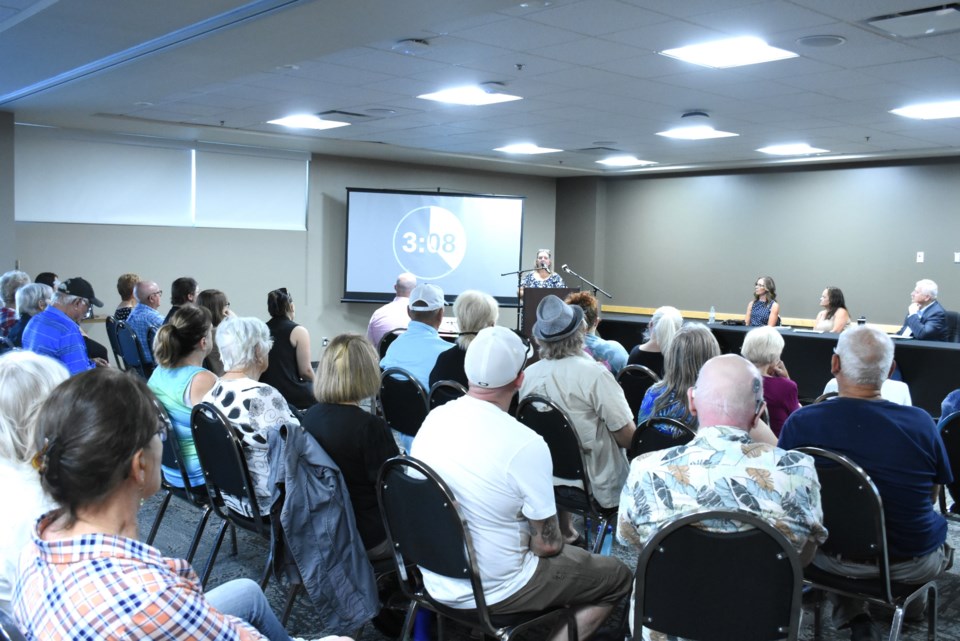, city council opened a forum for concerned residents to speak their minds for five minutes on the topic of safety in downtown Moose Jaw.
This article is part of a three-part series and focuses on some of the solutions brought up by concerned residents at that meeting.
Building therapeutic relationships
Maxton Eckstein is the co-ordinator at Square One Community Inc. He has a decade of experience working with the chronically homeless through a Regina Housing First program.
“What works? What turns a life around?” he began. “The answer is relationships.
“Studies have shown that up to 70 per cent of someone’s rehabilitation comes from their relationship with their key worker — not the size of the program, funding, facilities, (or) the specific programming offered.”
Building healthy relationships involves boundaries and clear expectations of behaviour. Crystal Harvey, who described herself as a single mom and passionate volunteer, said she’s witnessed the successes of this attitude when volunteering with St. Aidan Anglican Church’s meal program.
Crystal Peterson, who manages the Willow Lodge shelter, said many of her clients — who oftentimes start out as being slow to trust and slow to learn — soon improve by “leaps and bounds” once they receive a listening, non-judgmental ear.
Building a sense of belonging is something any citizen can do, as Megan Nash pointed out. After she found herself feeling uncomfortable around one particular homeless gentleman, she said “Hello” and started to build report.
“He’s actually such a sweetheart… And for me, that’s Moose Jaw right there,” she added.
Donna Boyer, who works with Journey to Hope, said this sense of belonging can be achieved through something as simple as a Christmas care package and a positive message.
Accessibility of services
Advocates of the downtown location for the shelter say the site is crucial because it’s where affected individuals currently live, and Eckstein said individuals will stay where their social connections are.
Connie Conrad added that the location is “a pretty good fit” as it’s only a few blocks from the Riverside Mission, is close to downtown services, is outside of a residential area, and the police station is only three blocks away if needed.
“Attempting to restrict or relocate services will not only isolate people, but will create a self-fulfilling prophecy of creating the high risk behaviours a plan like this purports to eliminate…,” Eckstein said.
“Our shelters are not a stopgap for someone to get stuck in,” he continued. “They are a gateway into the support system that will change somebody’s life and they need to be located where people are.”
Wrap-around supports
The causes of homelessness, mental health struggles, and addictions stem from complex and highly individual roots, but the majority of the criminal behaviours exhibited by certain individuals often boils down to survival instincts.
Boyer said human survival needs include food, water, clothing, sleep, and shelter, and core human needs entail love, connections, significant personal growth, and contributing to society.
“To support people’s mental wellness, they need their survival and core needs met first,” she said.
A continuum of social supports, Mary Lee Booth explained, involves an emergency shelter as a first step, but also rapid rehousing with a focus on independent living, barrier-free access to health, community outreach, and social services to aid in recovery.
“Once someone is housed with actual wraparound supports, that is when real change occurs,” Eckstein said. “In practice, I have found that over 90 per cent of the clients I have worked with personally chose to deal with an addiction after they were housed...”
Square One’s social housing advisory committee, Booth said, is currently being assembled to facilitate this wraparound support and addresses a point brought up by Rom Jukes, who said one key to a working solution is removing the silo effect keeping separate organizations from communicating and cooperating.
Megan Jasper, who is seven years clean after facing a period of addiction and homelessness, said the key to her recovery was through a shelter such as the one proposed for Moose Jaw that focuses on long-term solutions.
Housing and ongoing supports are important, and Jasper pointed out that many on the streets are at a serious disadvantage due to the lack of important resources.
“People tell you, ‘Go get a job,’” she said. “Would you hire me… if I hadn’t slept in seven days? If I stunk, would you hire me?
“I know that there are people on the streets right now that are willing and able to work,” she said. “I was willing.”
Carolyn Ross, a Good Neighbours Group member, said the community “needs to focus on the reality of a long-term recovery plan” and suggests utilizing the Five Stream Process. This process entails an examination of the problem, its solution, as well as relevant politics, processes, and proposed programmes.
“The ultimate goal is a recovery community for everyone,” Ross said. “I’ve been in contact with an organization that supports the Five Stream Process and is currently in a southern Saskatchewan Community. The success rate is high.”
She said there’s at least one not-for-profit currently located in a Moose Jaw residential area that operates on this framework and is a model others should consider.
“We don’t have any concerns from any of the residents in that area,” she said. “The organization is operating on a smaller scale and provides all the wraparound services any individuals may require.”
Harvey said one attribute of a successful recovery program is a place anyone can feel comfortable when they’re having a mental health crisis, and nobody should be left to struggle alone. Businesses or residents targeted by certain individuals should also have access to an outreach worker who can assist in person when needed.
“We have the opportunity before us to be leaders in the care and support of those less fortunate,” Conrad concluded, perhaps summarizing the spirit of the evening.




